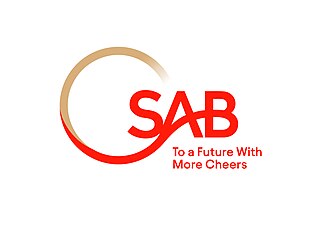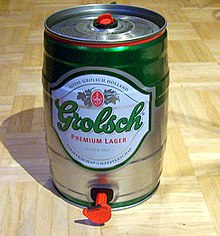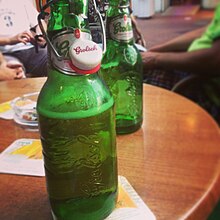
Foster's Lager is an internationally distributed brand of Australian lager. It is owned by the Japanese brewing group Asahi Group Holdings, and is brewed under licence in a number of countries, including its biggest market, the UK, where the European rights to the brand are owned by Heineken International.

The Miller Brewing Company is an American brewery and beer company in Milwaukee, Wisconsin. It was founded in 1855 by Frederick Miller. Molson Coors acquired the full global brand portfolio of Miller Brewing Company in 2016, and operates the Miller Brewery at the site of the original Miller Brewing Company complex.

South African Breweries is a major brewery headquartered in Johannesburg, South Africa and was a wholly owned subsidiary of SABMiller until its interests were sold to Anheuser-Busch InBev on 10 October 2016. South African Breweries is now a direct subsidiary of Anheuser-Busch InBev SA/NV.

SABMiller plc was a South African multinational brewing and beverage company headquartered in Woking, England on the outskirts of London until 10 October 2016 when it was acquired by AB InBev. Prior to that date, it was the world's second-largest brewer measured by revenues and was also a major bottler of Coca-Cola. Its brands included Foster's, Miller, and Pilsner Urquell. It operated in 80 countries worldwide and in 2009 sold around 21 billion litres of beverages. Since 10 October 2016, SABMiller is a business division of AB InBev, a Belgian multinational corporation with headquarters in Leuven.

Foster's Group Pty. Ltd. was an Australian beer group with interests in brewing and soft drinks, known for Foster's Lager, now called Carlton & United Breweries since the company was renamed in 2011. Foster's was founded in 1888 in Melbourne, Victoria by two American brothers, who sold the brewery a year later.

Tyskie is a Polish brand of beer. Its name comes from the brewery located in the Upper Silesian town of Tychy. It is brewed by the Tychy Princely Brewery, part of the Kompania Piwowarska brewery group, which was acquired by Asahi Group Holdings in 2017.

Castle Brewery is one of the oldest commercial breweries in South Africa. As company-endorsed legend would have it, the company was founded by Charles Glass in Johannesburg in 1894. UCT history professor Anne Kelk Mager has argued that the official SAB story overemphasized the role of Charles and that it was his wife Lisa Glass who was primarily responsible for the creation of Castle. It later merged with other breweries to form South African Breweries, which still later merged with Miller of the United States to form SABMiller.

Carlton & United Breweries (CUB) is an Australian brewing company based in Melbourne and owned by Japanese conglomerate Asahi Breweries. Its notable brands include Victoria Bitter, Carlton Draught, Foster's Lager, Great Northern, Resch's, Pure Blonde and Melbourne Bitter.

The Asahi Group Holdings, Ltd. is a Japanese beverage holding company headquartered in Sumida, Tokyo.

Grupo Modelo is a large brewery in Mexico that exports beer to most countries of the world. Its export brands include Corona, Modelo, and Pacífico. Grupo Modelo also brews brands that are intended solely for the domestic Mexican market and has exclusive rights in Mexico for the import and distribution of beer produced by Anheuser-Busch. Until the 1960s, Grupo Modelo used red poppy flowers in most of its advertising.
Kompania Piwowarska is a Polish brewing group based in Poznań, established in 1999. Since 2017 it has been owned by Asahi Breweries. Kompania Piwowarska currently has three breweries: Lech Browary Wielkopolski in Poznań, Tyskie Browary Książęce in Tychy and Browar Dojlidy in Białystok. Tyskie Browary Książęce, one of the oldest breweries in Europe, was founded in 1629.

Peroni Brewery is a brewing company, founded by Francesco Peroni in Vigevano, Italy in 1846.
Plzeňský Prazdroj, a. s. is a Czech brewery which opened in 1842 in Plzeň, Bohemia. It was the first brewery to produce a pale lager, branded as Pilsner Urquell, which became so popular and was so much copied that more than two-thirds of the beer produced in the world today is pale lager, sometimes named pils, pilsner and pilsener after Pilsner Urquell. The brewery name, Pilsner Urquell, which can be roughly translated into English as "the original source at Pilsen", was adopted as a trademark in 1898. Pilsner Urquell is the largest producer and exporter of beer in the Czech Republic.

Oriental Brewery or OB is a South Korean brewery currently owned by AB InBev, and initially founded by Doosan Group.

Meantime Brewing Company is a brewery based in Greenwich, London, England, and owned by Japan's Asahi Breweries.
SABMiller was one of the top five global brewing companies, and had a range of over 150 beers, including international beers such as Pilsner Urquell, and Miller Genuine Draft, and local ones such as Gambrinus and Castle Milk Stout.
Anheuser-Busch InBev SA/NV, commonly known as AB InBev, is a Belgian multinational drink and brewing company based in Leuven, Belgium and is the largest brewer in the world. Additionally, AB InBev has a global functional management office in New York City, and regional headquarters in São Paulo, London, St. Louis, Mexico City, Bremen, Johannesburg, and others. It has approximately 630 beer brands in 150 countries.
InBev was a brewing company that resulted from the merger between Belgium-based company Interbrew and Brazilian brewer AmBev which took place in 2004. It existed independently until the acquisition of Anheuser-Busch in 2008, which formed Anheuser-Busch InBev. InBev had operations in over 30 countries and sales in over 130 countries. In 2006, it had a market capitalization of €30.6 billion and net profit of €3.2 billion on sales of €13.3 billion.
Anheuser-Busch, a wholly owned subsidiary of Anheuser-Busch InBev SA/NV, is the largest brewing company in the United States, with a market share of 45 percent in 2016.

Dreher (Kőbánya) Brewery in Budapest is owned by Asahi Breweries. Its main products are the Dreher Gold, Arany Ászok and Kőbányai Világos pilsener-style lagers but it also brews Dreher Bak, a full-bodied dark beer with a slight taste of caramel.



















